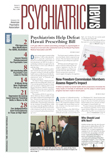The U.S. Food and Drug Administration (FDA) granted final marketing approval to two new products indicated for use in psychiatric disorders. Both represent treatment options that significantly differ from medications already on the market.
The FDA granted final approval April 6 to a joint application submitted by Shire PLC and Noven Pharmaceuticals to market the companies' methylphenidate transdermal system (MTS) under the brand name Daytrana.
The new patch to treat attention-deficit/hyperactivity disorder (ADHD) is indicated for use in children aged 6 to 12. Noven will manufacture the product, while Shire will be responsible for marketing and distributing it worldwide.
MTS, the first non-oral ADHD medication, will be available in four dosage strengths, with individual skin patches containing a total of either 27.5 mg, 41.3 mg, 55 mg, or 82.5 mg. Of the total amount of methylphenidate available in the patch, the nominal dose of the drug absorbed through the skin over the course of the recommended wear-time of nine hours will be 10 mg, 15 mg, 20 mg, or 30 mg. (The product will be labeled according to the dose of methylphenidate absorbed, not the total dose available in the patch.) The companies said the product should be on pharmacy shelves in June.
Prescribers are reminded in the new product's labeling that because absorption of methylphenidate through the skin is subject to significantly less first-pass metabolism through the patient's liver, “a much lower dose of Daytrana on a mg/kg basis compared to oral dosages may still produce higher exposures of methylphenidate with transdermal administration compared to oral administration.” As such, patients may achieve comparable symptomatic control on lower doses of MTS than oral forms of methylphenidate.
“The FDA's approval of Daytrana offers an important new option in the treatment of ADHD in children,” said Robert Findling, M.D., in a press release issued by Shire. Findling, a lead investigator in the MTS clinical trials program, is a professor of psychiatry and director of the Division of Adolescent and Child Psychiatry at Case Western Reserve University School of Medicine.
“Daytrana,” Findling continued, “has been shown to be effective and generally well tolerated in clinical studies and offers ADHD treatment in the convenient form of a patch.”
Side-Effect Warning Issued
It is, however, contraindicated in patients with marked anxiety, tension, and agitation, as well as in those known to be hypersensitive to methylphenidate. In addition, the MTS should not be used in patients who have glaucoma or tic disorders, or who have taken a monoamine oxidase inhibitor within 14 days of wearing an MTS patch.
Its label will include existing warnings regarding sudden death in patients taking CNS stimulants who have known or occult structural cardiac abnormalities. The label will also warn of the potential for patients wearing MTS patches to develop a contact sensitization. Local redness at the site of patch application is common, the label notes; however, if redness is accompanied by edema, papules, or vesicles and does not significantly improve within 48 hours, sensitization should be suspected. Use of the MTS should be discontinued if sensitization is suspected.
In clinical trials, the MTS was shown to be effective in reducing symptoms associated with ADHD as measured by the ADHD Rating Scale–IV. Children in clinical trials wearing the active patch showed twice the amount of symptom improvement as children wearing a placebo patch. The most common adverse events in patients wearing the patch during clinical trials included those known to be associated with methylphenidate, such as decreased appetite, insomnia, nausea, vomiting, weight loss, tic, and affect lability.
Alcohol Abuse Drug Approved
The FDA granted final approval on April 13 of a joint application from Alkermes and Cephalon to market a long-acting, injectable formulation of naltrexone under the brand name Vivitrol.
It is the only once-monthly medication for alcohol dependence and is indicated for patients who are able to abstain from drinking in an outpatient setting and are not actively drinking when initiating treatment.
Vivitrol “ensures [that] patients get the benefit of medication over the entire month,” said Richard Rosenthal, M.D., chair of psychiatry at St. Luke's–Roosevelt Hospital Center and a professor of psychiatry at Columbia University College of Physicians and Surgeons.
Rosenthal, who participated in Vivitrol clinical trials, added, “With Vivitrol, physicians have a new option to help treat patients with alcohol dependence, and patients have new hope to help them in their battle with this devastating disease.”
Vivitrol will be available as a single dose of 380 mg of naltrexone for intramuscular injection to be administered once a month. The product is expected to be on pharmacy shelves by the end of June and will be jointly marketed by Alkermes and Cephalon.
Efficacy of the long-acting injection was demonstrated in clinical trials, with patients receiving injectable naltrexone achieving significantly greater reduction in heavy drinking days than those administered a placebo injection.
The most common adverse events noted with the injection were nausea, vomiting, headache, dizziness, fatigue, and injection-site reactions.
Because naltrexone has the capacity to cause cellular injury in the liver at higher doses, the drug is contraindicated in patients with acute hepatitis or liver failure, and its use in patients with active liver disease should follow careful consideration of both risks and potential benefits.
Because naltrexone is a potent opioid antagonist, the drug should not be used in patients receiving opioid analgesics, those with physiologic dependence on opioids, or those in acute opioid withdrawal.
Prescribing information for Daytrana is posted at<www.daytrana.com>; prescribing information for Vivitrol is posted at<www.vivitrol.com>.▪
